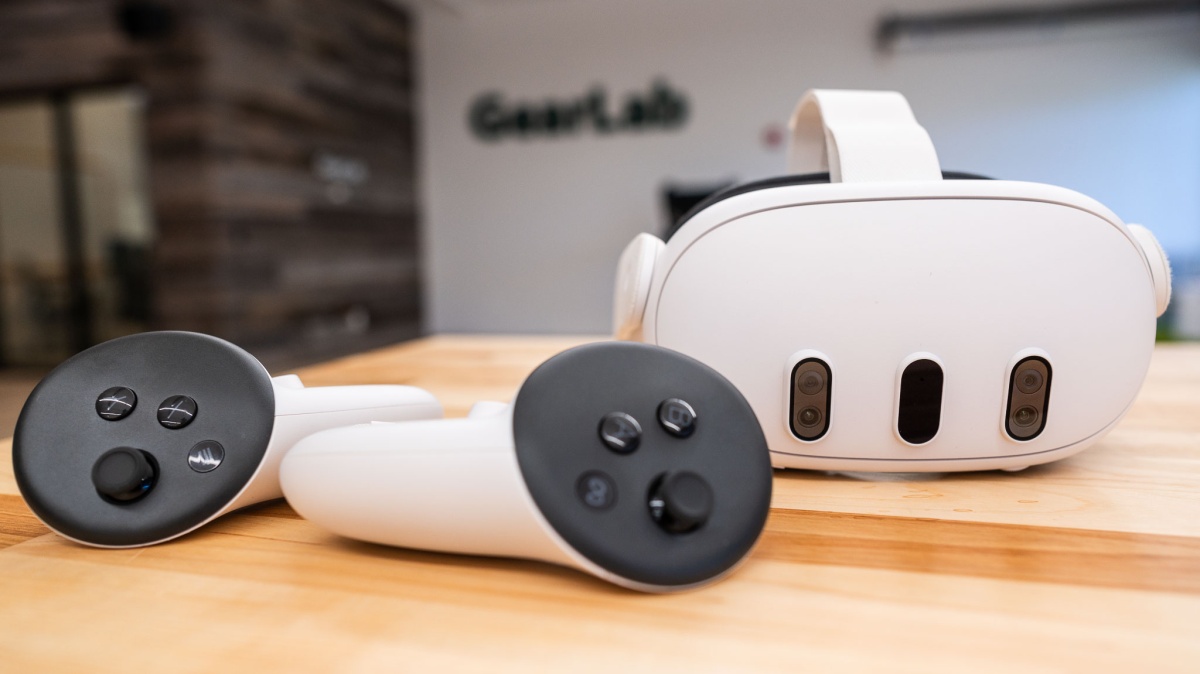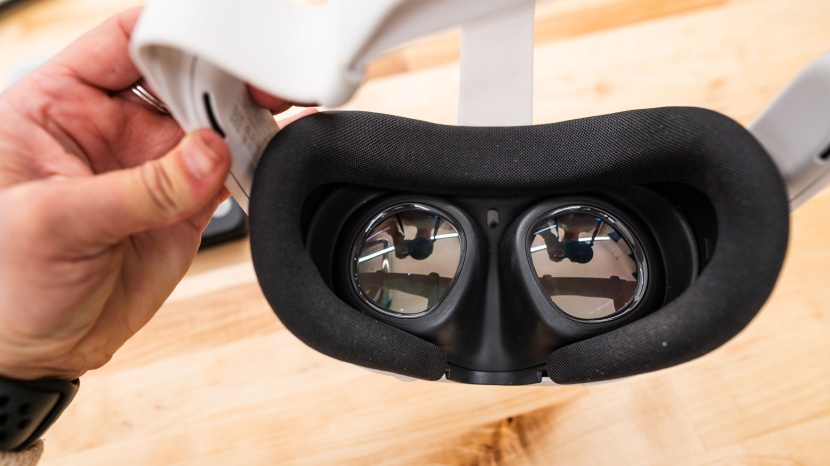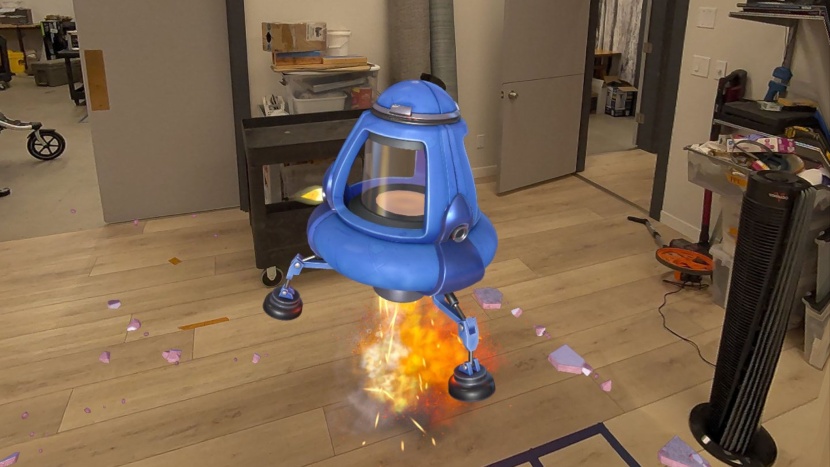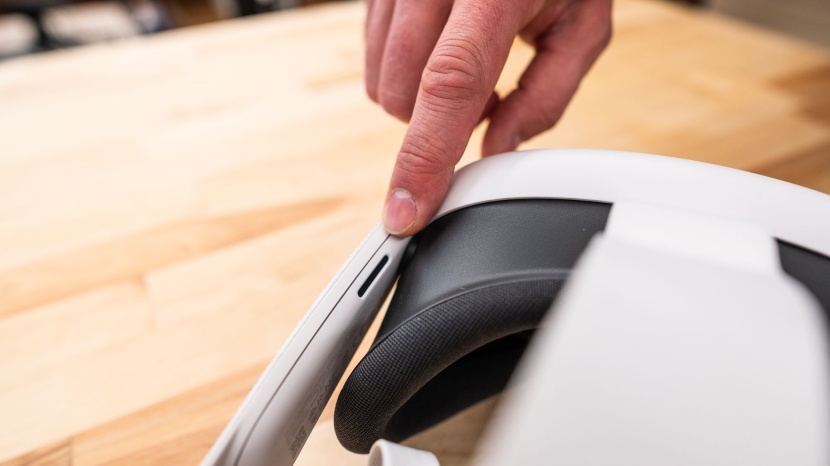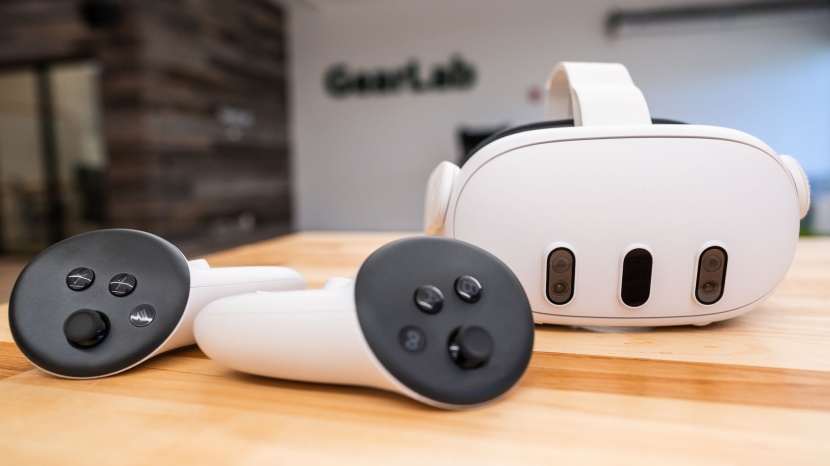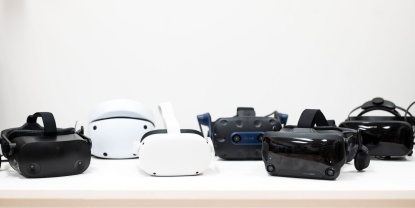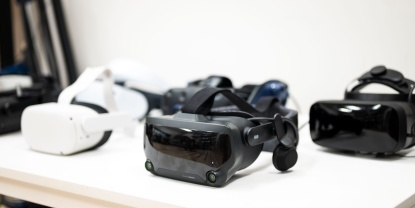Our Verdict
Compare to Similar Products
 This Product Meta Quest 3 | |||||
|---|---|---|---|---|---|
| Awards | Best Overall/Stand Alone | Runner Up Headset | Working and Relaxing | ||
| Price | $500 List $499.99 at Amazon | $999 List | $550 List $399.99 at Amazon | $3,699 List | $799 List $685.51 at Amazon |
Overall Score  |
|||||
| Star Rating | |||||
| Bottom Line | One of the best standalone headsets on the VR market represents evolutionary improvements on the Quest 2 at a reasonable price | A solid and high-performing VR headset that doesn't require a top-shelf GPU | This great value headset should excite PS5 players looking for upgraded VR immersion | A sharp innovative (and expensive) display geared more toward browsing, work, and movie watching than gaming | This headset will appeal to users with glasses or who require top-notch tracking precision |
| Rating Categories | Meta Quest 3 | Valve Index | PlayStation VR2 | Apple Vision Pro | Vive Pro 2 Headset |
| Tracking (35%) | |||||
| Comfort (30%) | |||||
| Visuals (15%) | |||||
| User Friendliness (15%) | |||||
| Ease of Setup (5%) | |||||
| Specifications | Meta Quest 3 | Valve Index | PlayStation VR2 | Apple Vision Pro | Vive Pro 2 Headset |
| Measured Weight | 1.13 lbs | 1.86 lbs | 1.31 lbs | 1.37 lbs | 1.94 lbs |
| Tracking type | Built-in Cameras | External Sensors | Built-in Cameras | Built-in Cameras | External Sensors |
| Per Eye Manufacturer Resolution | 2064 x 2208 | 1440 x 1600 | 2000 x 2040 | 3660 x 3200 | 2448 x 2448 |
| IPD Adjustment | Mechanical IPD: 53 - 75mm | Mechanical IPD: 58 - 70mm | Mechanical IPD: 57 - 73mm *Rough measurement |
Automatic IPD: 51 - 75mm | Mechanical IPD: 57 - 70mm |
| Measured Horizontal Field of View | 100º | 110º | N/A | 95º | 110º |
| Measured Vertical Field of View (Up) | 35º | 40º | N/A | 25º | 32º |
| Measured Vertical Field of View (Down) | 45º | 45º | N/A | 35º | 32º |
| Manufacturer Field of View | 110º | Optimized eye relief adjustment allows a typical user experience 20º more than the HTC Vive | 110º | N/A | Up to 120º |
| Manufacturer Refresh Rate | 72, 80, 90, 120Hz | 80, 90, 120, 144 Hz | 90, 120 Hz | 90, 96, 100Hz | 90, 120 Hz (only 90Hz supported via VIVE Wireless Adapter) |
| Sound | Built-in headband 3.5 mm audio port optional |
Built-in, 37.5mm off-ear | 3.5 mm port, included earbuds Bluetooth connected via the Console |
Built-in headband | Built-in, on or off-ear |
| Connection Type to PC | Stand alone (Optional PC Connection: Meta Quest Link Cable and Air Link ) |
- DisplayPort 1.2
|
- USB-C | Wifi with a 3rd party workaround | - DIsplayPort (DP to mini-DP adapter included)
|
| Room For Glasses | Average | Below average | Excellent | No | Above Average |
| Manufacturer Minimum PC Specs | Optional Link Cable Setup OS: Windows 10 / Windows 11 Processor: Intel i5-4590 / AMD Ryzen 5 1500X or greater Memory: 8GB+ RAM USB Port: 1 USB Port |
OS: Windows 10 Processor: Dual Core with Hyper-Threading Memory: 8 GB RAM Network: Broadband Internet connection Additional Notes: Available DisplayPort (Version 1.2) and USB (2.0+) Port Required |
N/A Uses PS5 | N/A | OS: Windows 11 / Windows 10 Processor: Intel Core i5-4590 or AMD Ryzen 1500 equivalent or greater Memory: 8 GB RAM or more Video Out: DisplayPort 1.2 or higher. DisplayPort 1.4 or higher with DSC is required for Full Resolution mode. |
| Manufacturer Minimum GPU | Optional Link Cable Setup Supported GPUs: NVIDIA Titan X, NVIDIA GeForce GTX 970, NVIDIA GeForce GTX 1060 Desktop 6GB, NVIDIA GeForce GTX 1070(all), NVIDIA GeForce GTX 1080(all), NVIDIA GeForce GTX 1650 Super, NVIDIA GeForce GTX 1660, NVIDIA GeForce GTX 1660 TI, NVIDIA GeForce RTX 20-series (all), NVIDIA GeForce RTX 30-series Please Note: NVIDIA 3050 (laptop) and 3050ti GPUs are not recommended for use with Link. AMD 400 Series, AMD 500 Series, AMD 5000 Series, AMD 6000 Series, AMD Vega Series Please note: the Radeon RX 6500 is not recommended for use with Link. |
NVIDIA GeForce GTX 970, AMD RX480 | N/A Uses PS5 | N/A | NVIDIA GeForce GTX 1060 or AMD Radeon RX 480 equivalent or greater. (Not full resolution) |
| Manufacturer Recommended PC Specs | Optional Link Cable Setup OS: Windows 10 / Windows 11 Processor: Intel i5-4590 / AMD Ryzen 5 1500X or greater Memory: 8GB+ RAM USB Port: 1 USB Port |
Processor: Quad Core + Additional Notes: Available USB (3.0+) Port Required for Headset Pass-Through Camera & USB Port Support |
N/A Uses PS5 | N/A | Better than Minimum Specs |
| Manufacturer Recommended GPU | Optional Link Cable Setup Nvidia RTX 20 Series, AMD Radeon RX 6000 Series, or greater |
NVIDIA GeForce GTX 1070 or better | N/A Uses PS5 | N/A | GeForce RTX 20 Series (Turing) or AMD Radeon 5000 (Navi) generations or newer required for Full Resolution mode. |
| Hardware Platform Needed | Stand alone (optional tether to VR ready PC) |
PC | PS5 (PlayStation 5) | Stand alone | PC |
Our Analysis and Test Results
Meta's Quest 3 levels up from its previous model with a more user friendly experience, better visuals, improved tracking, and a more comfortable fit, all while allowing access to a wide range of gaming and experience options in the Steam and Meta libraries.
Tracking
Responsiveness and accuracy allow for a more immersive and satisfying experience, and both of these factors depend heavily on the product's tracking technology. The Quest 3 uses built-in cameras to for tracking, and through the lenses of this metric, it performed significantly better than its predecessor but didn't beat the average for the group. Though still not on par with the tracking performance that can be had with external sensors, movement was excellent.
As with all systems, results can vary depending on the quality of the game being played, whether a computer is concurrently engaged in other demanding tasks (e.g., downloading other games), WiFi speed, etc. With most games, once downloading has finished, performance improves dramatically. However, when playing Beat Saber, we still occasionally missed notes in the periphery despite accurate timing on our end. As was our experience with Quest 2, we had trouble with the controllers occasionally losing track and doing off-the-wall bonkers stuff when navigating the menu, and it would sometimes take time to get back to “normal” for the hands. This is one area we would love to see improved in future iterations of this headset.
With headset tracking, the Quest 3 handled our circular wall test without issue. The position was good and away from the walls rather than in them as is sometimes the case with other headsets. We also never had trouble with the walls catching up with us, unlike with the Quest 2. It was nice and smooth sailing. While playing Super Hot, we had no issues with the headset losing tracking, and we felt the visuals were always right on target. Pass-through worked well, too, and we encountered basically zero delay while sitting and doing quick movements.
Comfort
The comfort of a headset depends mostly on weight, breathability, and security of the fit. Despite not being perfectly balanced and weighing 3/8 of an ounce more than its predecessor, the Quest 3 feels pretty light on the face and doesn't put all that much pressure on the nose or cheekbones. While the top strap relieves a good amount of the weight, most of it is felt on the forehead. The fabric touching the face is pretty soft and comfortable even if you crank down on the tightness of the headset, and the lenses didn't hit our noses during normal use.
As is the case with just about every headset, shaking your head hard enough will cause the lenses to (most likely) hit your nose. Quick, jerky movements will cause this, as well, but we appreciated that it wasn't as painful of an experience as it was with the Meta Quest 2. In terms of breathability and warmth, the Quest 3 landed in the middle of the group. This was due to a mix of mediocre breathability and some radiant heat from the components. As tends to happen with many headsets, one tester noticed random “hot flashes” on his forehead from the face pad. We weren't super surprised, however, this also contributed to it's average performance in terms of the heat aspect. When taking all aspects of comfort into account, though, it earned one of the best scores for the group.
Visuals
We found the visuals of the Quest 3 to be satisfactory, but not quite as great as some of the higher end models in our testing. We like that the sweet spot for this model is basically the entire lens; we could read things way off in the corners without a ton of screen door effect (SDE). You can see some SDE if you're really looking for it, the biggest indicator is that text is not always crisp, but it can be easily ignored.
We measured the field of view for each model in Realovirtual Workshop. We recorded the horizontal at roughly 100°, the upward vertical at about 35°, and the downward vertical at around 45°. We could see 50° down if really straining, but we could only just make out a single small figure in front of us. To test clarity, we also used Realovirtual Workshop and read a paragraph of text at different distances. At one meter, the paragraph was fairly easy to read. At two meters, it was still readable but more difficult — some letter blending made it hard to read certain words. The screen fared well during our glare test, with minimal glaring, even from bright white text. We tested visuals in a more natural scenario by playing Beat Saber. We could read the leaderboard numbers fairly well and were able to still see them even when looking directly at them. In the periphery, we could see the beginnings of each name but couldn't quite make them out.
User Friendliness
We found the Quest 3 to be excellent for daily personal use. It has an easy initial setup while still being decently shareable. It utilizes friction sliders to adjust the length of the side straps and velcro closure to adjust the top strap. It is easy to adjust, put on, and remove as long as you watch out for your hair. We also found that the adjustment settings stay relatively fixed even when it's not on your head, which is why we found it especially great for personal use. It offers somewhat of a set-it-and-forget-it configuration. The interpupillary distance (IPD) wheel at the bottom left is a little stiff but holds its place well and allows for a good level of fine-tuning for individual pairs of eyes. The sound system is integrated into the headband, and the mic is built-in as well. The speakers can get plenty loud, which can help create a more immersive experience for the user, but be warned that people nearby can hear what is going on too. Overall, the Quest 3 performed above average in this metric.
As we mentioned above, we appreciated that the headset stays mostly adjusted, but we did find ourselves readjusting the back strap almost every time we put the headset on just to double-check that it was tight enough. However, all the straps are elastic, so once you find a setting you like, you can stretch it over your head to put it on and take it off fairly easily. If you want to share your headset with a friend who has a different size head than you, the friction sliders work ok. The method isn't as simple as a knob, but it works well and doesn't take long to find a good fit.
Ease of Setup
As with its previous iteration, the Quest 3 is streamlined for an easy setup, which we love. With no extra hardware, sensors, or wires needed, this standalone headset appeals with its relatively painless process, and it earned one of the highest performance scores in this metric. Savvy gamers and wide-eyed newbies alike will appreciate being able to plunge headlong into virtual worlds without too much to do beforehand.
There is a QR code when you open the box that says “Scan to start,” which then prompts you to download the Meta App. If you don't have one already, you'll need to make an account, create an avatar, and then add a payment method. You can also select language, adjust the headset, adjust the IPD of the lenses, set up WiFi, and then continue in the app to dial in the Room Scale. It's all very easy. The software can suggest a barrier, or you can quickly draw one. To get the most out of your experience, we recommend a safe and unobstructed space measuring at least 6.5 feet by 6.5 feet (2 meters by 2 meters). We appreciate that the headset remembers the location of your barrier, so if you are standing outside the barrier at any point, you can see the boundaries of the barrier until you walk inside it, after which the screen changes. Oh, and don't forget to remove the battery tabs from the controllers.
Should You Buy the Meta Quest 3?
The Meta Quest 3 is one of the best values in the market today, offering great visuals in a standalone unit while also offering the ability to tether to a computer for wider access to the Metaverse and Steam libraries. Many users will also appreciate that it is portable and easy to share with friends for group gaming sessions. If gaming is not a priority for you but a stellar visual experience is, you might consider other headsets with higher screen resolution, while gamers who want higher levels of tracking accuracy may be drawn to a system with external sensors. But for just about everyone else, the Quest 3 ticks enough boxes to give it a broad appeal.
What Other VR headsets Should You Consider?
Those who are more interested in watching VR movies and working in apps might consider the Apple Vision Pro. It offers an incredible visual experience; however, its tracking is not well suited to the world of VR gaming. It also comes with a very hefty price tag that may deter some users. If you are a gamer who wants higher levels of tracking accuracy, you would do well to consider a headset with an external sensor system such as the Valve Index, which offers comparable levels of comfort and user-friendliness with good visuals and stellar tracking.


